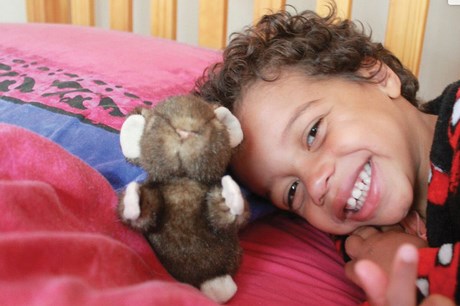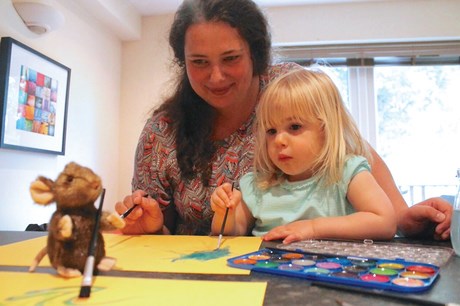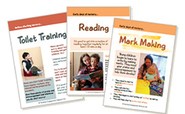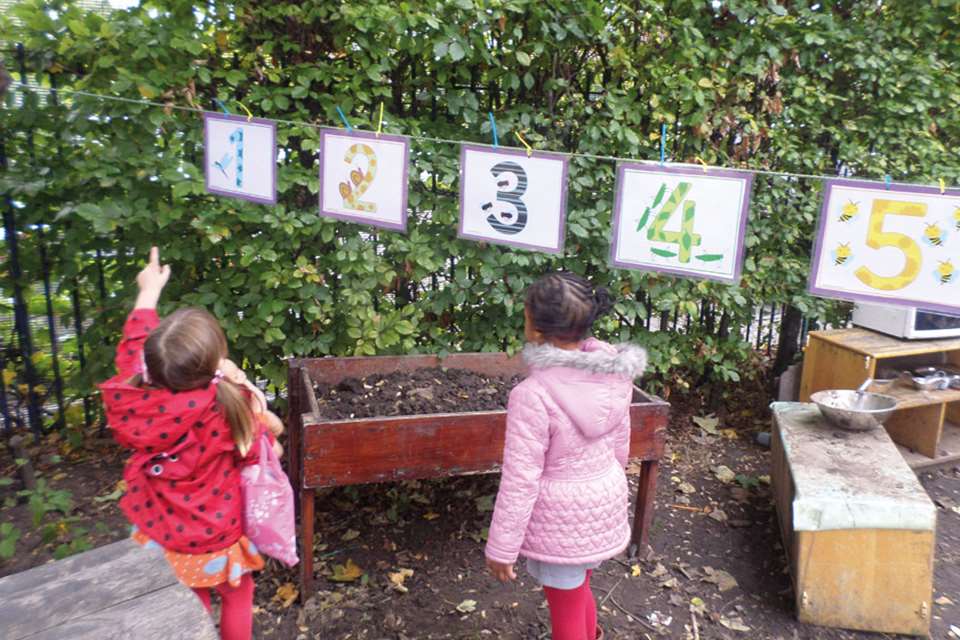Positive Relationships: Parenting Programmes - Word of mouse
Annette Rawstrone
Monday, October 31, 2016
A furry toy is being used to engage parents in their children’s learning, finds Annette Rawstrone

There’s a rodent epidemic, with schools infesting families with mice. The cuddly toys are being welcomed into Greater Manchester households as part of a project that aims to improve the outcomes of children from disadvantaged families through greater parental engagement in the early years.
The furry mice are being used by the Parental Engagement Network (PEN) to build fun, non-threatening relationships between home and school and to help prepare children for the transition into education. The Engaging Parents Effectively project, supported by the Sutton Trust and funded by the Esmee Fairbairn Foundation, aims to engage disadvantaged families in the early learning of their child and school life by:
- training and supporting staff
- providing high-quality resources for staff to use
- parents receiving ongoing daily support from school staff
- school staff developing their confidence and skills in supporting parents, and
- parents becoming more confident and active in enabling their children’s learning.
‘By the time children start school there’s already a large gap between the most and least advantaged pupils,’ says Emma Beresford, director of PEN. ‘This project is aimed at disadvantaged families who struggle to engage in education. It’s about empowering parents, giving them confidence and skills to work with their children. It’s not just about the immediate but also the long-term knowledge that they have an important role in their child’s education.’

ENJOYABLE AND INTERACTIVE
This four-phase project, funded from April 2015 until September 2017, involves more than 60 schools and is part of a national research project being evaluated by Oxford University’s education department, with schools assigned to different groups as part of a randomised control trial. The initial trial and phase two have been completed, while phases three and four, where mice are given to families as part of the home learning and transition into school, are on­going. The aim is to develop a model of training and resources that can be rolled out nationally.
The project involves inviting target families to teacher-run workshops at the school in June and July before their children start nursery or Reception in September. The workshops are designed to be enjoyable and interactive, with around 12 families attending at a time.
Along with receiving the popular toy mice, they take part in discussions on issues such as screentime and sleep and are given tip sheets for preparing their child for school. The sessions also enable parents and children to build relationships with the other families and staff.
‘The mouse is a more indirect and fun way to get messages across without appearing judgemental. They love it,’ says Ms Beresford. ‘There are lots of issues raised around three- or four-year-olds not being ready to start school, including poor language development, behaviour, lack of routines and not being toilet-trained. Through the mouse, we’re able to talk to families about this and encourage them to do activities at home with the mouse.’
For example, teaching staff had concerns about one girl who had no bedtime. Using the mouse, they built up a dialogue with the family and the child started to take the mouse to bed with her, resulting in her routines improving, which supported her engagement in school life.
The mice can continue to be used in home-learning activities once the children are settled into school. Staff run workshops throughout the school year and give parents appropriate activities to do at home with their children.
These support language development, encourage increased outdoor activity and introduce fun maths activities, sharing books and mark-making. Families borrow Playclub bags which include books, CDs with songs, and instructions and props for imaginative activities directly linked to learning phonics.
‘While teachers often provide workshops on subjects such as phonics or maths, parents also need clear doable activities to support their children’s learning out of school, from identifying shapes in road signs while walking to the shops to singing action songs in the bath,’ says Ms Beresford. ‘Appreciating parents’ work with praise, celebrations and certificates is an important part of the project.’
CONFIDENT AND SKILLED
The nursery and Reception staff who deliver the training also receive support so that they become more confident and skilled in working with parents. ‘Teachers are comfortable working with children and feel in control, but standing in front of a room full of parents is different,’ explains Ms Beresford. ‘It’s an area not covered in most teacher training courses and makes many teachers anxious and scared of criticism from parents. If teachers and TAs feel more confident about working with parents, this can become embedded into their practice.’
The project is only midway through and the research findings are not yet available, but early feedback from the phase-two schools is positive, with 81 per cent of targeted families remaining involved in the project over the year doing additional activities with their children at home.
Many schools are reporting improvements in children’s outcomes such as improved language, better phonics and maths results and greater engagement in learning.
At Claremont Primary School Nursery in Moss Side, Manchester, it was reported that of the targeted children involved in the project:
70 per cent made accelerated progress (3+ levels) in reading and speaking, compared with 45 per cent and 48 per cent, respectively, of the nursery children overall.
90 per cent made accelerated progress in maths, compared with 80 per cent of the nursery children overall.
Feedback from parents is also positive. Comments from Rackhouse Primary School in Northern Moor, Manchester, include:
‘I really liked it – sometimes as parents you think that learning is just about sitting down and writing but this was fun… looking for things outside and doing things like running between trees and counting the number of times we did it. We all really enjoyed it.’
‘Now when we go out she looks for the letters in her name all around us. I’ve seen her come on a lot.’
‘We loved getting things out of the playclub bags – the whole family got involved. It means they’re not sat around on their tablet all the time.’
PEEP INTO PRE-SCHOOL
Valuing and building on the quality interactions that parents already have with their children is at the heart of Peeple’s Learning Together Programme. It aims to improve children’s life chances by encouraging parents to make the most of these everyday learning opportunities.
Peeple, the national organisation which runs Peep programmes to support parents and children learning together, now runs a 22-place pre-school in a disadvantaged area of Oxford where the scheme originated in 1995. The Parental Engagement Fund has enabled it to look at ways of integrating its Learning Together Programme into the setting and offering it to all parents of two-year-olds attending.
‘We want the programme to increase parental engagement in the pre-school and help families to feel confident when they move on to the next setting. Most of all we want parents to feel valued as their child’s first educator,’ says Peeple chief executive Sally Smith.
‘Not all parents realise that sharing books and stories, singing and sharing rhymes and engaging in conversation is the best way to support learning at an early age. If they know that these things are important and why they are important then we are giving them the power and knowledge to do more.’
The ORIM framework (Opportunities, Recognition, Interaction, Modelling), developed by Professors Cathy Nutbrown and Peter Hannon, is used on the programme to think about how the parents are helping their children’s development.
‘All parents do these things but some do them more purposefully and meaningfully than others,’ says Dr Smith. ‘This is an excellent starting point because parents do not feel judged or told what they are doing is wrong.’
Comments from parents include:
‘I feel pretty proud of myself, I didn’t realise I was teaching him how to listen.’
‘We didn’t realise what we were doing to support her learning. Now that we do, we do more of it.’
‘I didn’t realise all that my daughter was capable of and that opportunities for learning are everywhere.’
Parents attend 12 hour-long group sessions, supported by practitioners, where they work through topics with an emphasis on communication and language. Each session includes books, sharing stories and rhymes.
Parents are encouraged to work towards an NOCN qualification. This includes producing a journal tracking their child’s learning, which becomes a vibrant keepsake. So far, 15 parents have gained accredited units, with another 12 working towards them. For some it’s the first qualifications they’ve ever received. ‘We hope it’s the start of them going into voluntary, or hopefully, paid employment,’ says Dr Smith. She hopes to extend the programme to give parents the opportunity to consolidate their learning and build relationships with the group before starting the accredited learning.
‘You can understand why parents get resistant to people coming in and telling them what they are doing is wrong,’ says Dr Smith. ‘This course is about empowerment, understanding how children learn and develop and sharing that understanding with parents rather than keeping professional knowledge to ourselves. I hope it’ll become part of what parents expect when they attend a Peep pre-school.’
The Education Endowment Fund has awarded Peeple a grant to evaluate the programme’s impact, and it will recruit 150 settings to take part in the trial.
 MORE INFORMATION
MORE INFORMATION
www.suttontrust.com/programmes/parental-engagement-fund






